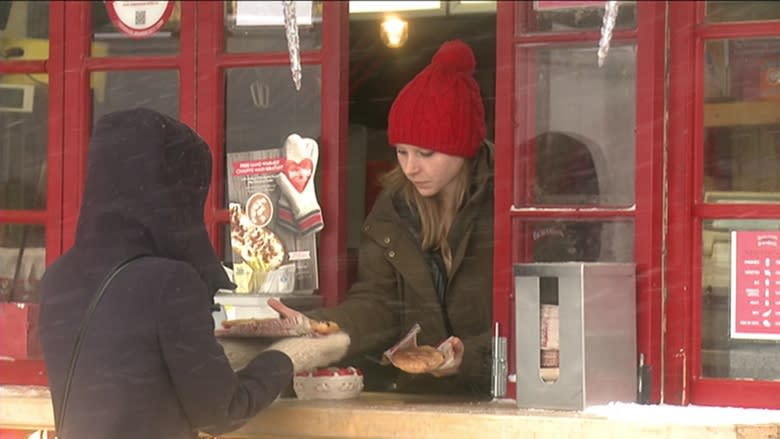Canadian Semiaquatic Rodent Posterior Doughnut is OK, just don't say beaver
For the latest development, see: Calgary Food Bank benefits from BeaverTails dispute
This is as Canadian of a tale as you can find.
BeaverTails Canada has asked a Calgary food columnist who writes for CBC to stop using the word "beaver" in one of her blog recipes that's a tribute to the much-loved pastry.
Julie Van Rosendaal has quite a following on her website, dinnerwithjulie.com, with a host of directions for dinners, desserts and treats.
It features a recipe for the now oddly named Canadian Semiaquatic Rodent Posterior Doughnut, which would taste rather familiar to many.
"Doesn't roll off the tongue quite as easily," Van Rosendaal told the Calgary Eyeopener on Wednesday.
For Canada Day 2016, she posted a recipe called "Homemade Beaver Tails," fried dough shaped like its so-named appendage, often dipped in cinnamon, Nutella or other yummy toppings.
In the post, she wrote it was a trademarked name, and linked to the company's website.
The BeaverTail is often sold by vendors at sporting events and along waterfronts in Eastern Canada. When he was U.S. president, Barack Obama once said they taste better than they sound.
But the company, which started in Ottawa in 1978, said Van Rosendaal was violating its trademark and asked that she change the name.
Van Rosendaal took out "tail" and called them "Beaver Doughnuts" but that wasn't good enough. This week, she received yet another email from the company.
The word beaver, the email said, is too similar to the trademark and could create confusion in the marketplace. The company asked Van Rosendaal to remove reference to the iconic Canadian animal from her recipe.
"BeaverTails, I understand, but I mean beaver? That should be a word that any Canadian can use, especially in reference to pastry," she said.
Other suggestions were thrown around — Rodent Rump and Latin for the critter, castor canadensis — but Van Rosendaal wanted to stick with the beaver style. She does a criss-cross on the dough so it catches the sugar and other toppings.
That pattern means calling it a "dewlap," a very Canadian suggestion from Eyeopener host David Gray, wouldn't work. A dewlap is the flap of skin hanging off a moose's throat.
And so, the Canadian Semiaquatic Rodent Posterior Doughnut was born.
"I ceased and desisted, yes, and I think I improved the name, don't you think?" she said.
As for BeaverTails, Van Rosendaal says she's not feeling scared and sees her recipe as a positive advertisement for the company.
"It's product association. I mean, if people are talking about it, I think that's a good thing," she said.
"They're delicious, fried dough. I mean, fried dough should only be about positivity and love and sharing of great things."
BeaverTails sends 'big Canadian sorry'
CBC News reached out to BeaverTails for comment, but did not receive a response.
On Thursday, the company emailed Van Rosendaal with what they called "a big Canadian sorry."
"You received a letter from our legal department as part of our normal trademark surveillance and protection...," the email said.
"An important part of any successful company is preserving the brand name. An equally important part is never forgetting our roots and we feel we have done that in this case. We want to make this up to you and anyone else who may feel we did not handle this the way a fun-loving, over-the-top Canadian company should."
BeaverTails also tweeted a public apology and offered to donate $1 to the Calgary Food Bank for every retweet, up to $2,500.
The apologies did not include giving Van Rosendaal permission to use the word "beaver" in her pastry recipe.
With files from the Calgary Eyeopener



